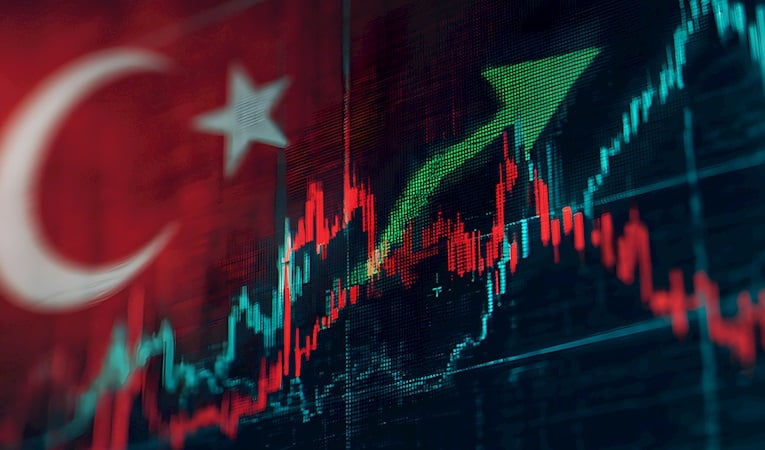- Anasayfa
- Haberler
- Tüm Haberler
- Yaşar’s Foreign Plan For After The Crisis
Yaşar’s Foreign Plan For After The Crisis
The 2001 crisis really shook the Yaşar Group. The group lost its bank and changed its company portfolio. Now it has a structure which is better prepared for a crisis and focused on several sectors,...
The 2001 crisis really shook the Yaşar Group. The group lost its bank and changed its company portfolio. Now it has a structure which is better prepared for a crisis and focused on several sectors, particularly foodstuffs and paint. Yaşar Holding Board Chairman Feyhan Yaşar says that they made a conservative budget for 2009 and that they foresee growth of 3-5 percent for the group as a whole. He forecasts that the group’s turnover will reach TL 2.1 billion. We spoke with Year Holding Board Chairman Feyhan Yaşar about how they managed the crisis and their targets and expectations for 2009.
* Were you ready for this crisis?
Yes, we foresaw the crisis. But it took time for the crisis to come to Turkey and for the world to accept this, and for institutions and states to take measures in this regard and to be transparent. We had a very good 2007 and we expected to grow very strongly in 2008. My colleagues were talking about how we would achieve growth of 20 off percent. The board of directors told them: “The developments in the rest of the world will affect Turkey and Turkey’s exports and exchange rates. So take these developments into account while preparing our budget.” And in fact, after June and July, the global problems began to make themselves felt in Turkey.
* What is the total amount of postponed investments and how much will you invest this year?
Under normal conditions, if there hadn’t been an economic contraction, as the Yaşar Group we would have invested US$60 million a year in 2009 and 2010. Now our target is to focus first on the domestic market. We shall move forward by protecting our profitability, market and quality.
* How are you managing this period?
I don’t much like the term crisis. I prefer to refer to periods of economic “growth” and “contraction”. If you don’t manage growth and contraction well, then there is a crisis. A lot of energy should be spent trying to maintain domestic demand and struggle against unemployment. We took, and shall continue to take, a number of measures to manage the period of contraction. But we are also closely monitoring consumer needs and looking for opportunities in growth and costs.
* How you believe that this period creates opportunities for growth?
To give an example, underground production declined. The resultant shortfall in supply can turn into an increase in demand for us. In paint, we shall push our export capabilities because the exchange rate has made them attractive. Previously, the exchange rate meant that we could not be competitive abroad.
* If it hadn’t been for the crisis where would Yaşar Holding be?
It is very difficult to be sure. Because we have had both gains and savings. In terms of the Yaşar Group’s turnover, we could have aimed for 10 percent more. But we protected our profitability.
* Is profitability the most important factor in the current period? What is it important to protect?
It is important to preserve liquidity and inputs. The length of payment terms on the market is increasing and there are delays in collecting payments. As a result, it is important to protect capital. We have limited our bank credits and credits from abroad. We are aiming for a system in which resources are used well. In fact, the formulae are well known, they are not unique to Yaşar.
* You have postponed the investments you were thinking of making in the Gulf states. Were the details there clear?
We had two projects in the Gulf states. One was in Abu Dhabi, which was related to a paint plant with a local partner. It was going to be a partnership of Yaşar Holding. We had completed all of the work and feasibility studies for it in the first half of 2008. The negotiations have been suspended until June. We are working with a strategic partner on a meat and frozen projects investment in Dubai. That project is going a little more slowly. The investment will probably take until 2010. We are aiming to work abroad with a local partner. There are some alternatives in Saudi Arabia but these are still at the initial stage. There are significant opportunities in the region but these will be discussed in 2009, prepared and then implemented when the economic environment has improved.
* How did the developments of the last quarter of 2008 affect the balance sheets of your companies?
We contracted a little in the final quarter of 2008. But January and February 2009 were better. We implemented savings. But we did not plan for a contraction. We forecast growth of 3-5 percent for Yaşar Holding. We were conservative when we were preparing our budget. Because you have the chance to prepare a pessimistic budget but you cannot prepare an optimistic budget.
* How will things stand at end-2009? What are your targets for this year?
I am not pessimistic. Our target is to achieve growth of between 3 and 5 percent. The Yaşar Group closed 2008 with turnover of TL 1.980 billion. In total we grew by 8 percent in 2008. This year, as a group, we are aiming to achieve a turnover of TL 2.1 billion.
What Did Yaşar Learn From The 2001 Crisis?
The Crises Of 2001 And 2008 Are Different
It is not possible to compare the two crises from the perspective of Turkey or from the perspective of the Yaşar Group. The 2001 crisis followed a V shape graphic. The problems that had accumulated since 1994 as a result of high inflation meant that there was a sudden drop. The banking system problems as a result of inflation suddenly made themselves felt.
The Need For Rehabilitation
People say that this crisis will be an L shape and that there is a possibility that the recession may last for a long time. As a group, we contracted significantly in 2001. We got out of the brewing business, we sold our fertilizer company and our financial-banking interests were taken over the SDIF. The group contracted by about 50 percent. After 2001 we began a significant rehabilitation. But we protected our core businesses and we recorded significant growth by restructuring.
We Have Compensated For The Losses
Before the 2001 crisis, the group had a turnover of nearly US$1.5 billion. Today we have once again reached the same size. In fact, long before the crisis, we had taken the decision to withdraw from some areas of business as the result of some studies conducted with McKinsey. We were looking for a partner for banking and insurance. We had initiated the sales process at Tuborg.
Sedef Seçkin Büyük
[email protected]
Ebru Firat
[email protected]
Türkiye ve dünya ekonomisine yön veren gelişmeleri yorulmadan takip edebilmek için her yeni güne haber bültenimiz “Sabah Kahvesi” ile başlamak ister misiniz?




